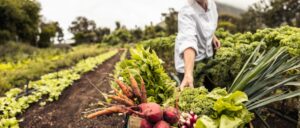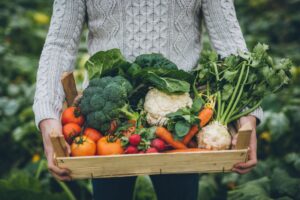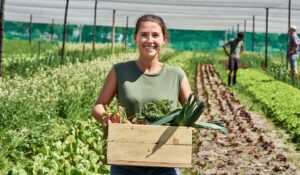Food and the Environment: How Choosing Sustainable and Organic Food Can Impact Our Health and the Planet

The world has become a much smaller place and food is getting more attention than ever before. As a result, the demand for sustainable farming practices and organic produce has never been greater.
If you have ever wondered what difference it makes if your produce came from an organic farm or not, this article will help answer that question by exploring some of the advantages of choosing organic food over non-organic options.
Sustainable agriculture is an approach to farming that promotes sustainable practices, including the use of natural resources, soil conservation, and resource management.
Sustainable farmers seek to minimize their impact on the environment by using renewable resources in their production processes and by minimizing waste generation during production.
Organic food is grown without pesticides or synthetic fertilizers, using only approved methods such as crop rotation and cover cropping (cropping strips over weeds).
Organic farmers use no antibiotics or growth hormones when animals are raised for meat or eggs, this helps prevent antibiotic resistance in humans as well as livestock health problems brought about by too many antibiotics being used unnecessarily on factory farms where animals are raised for food production purposes alone rather than for their meat like how it would have been done before these practices became widespread throughout North America due to industrialization trends beginning around 1890s when large corporations started buying up small family owned farms all across America which resulted in massive increases in profits while simultaneously decreasing wages per worker because they could get away with paying lower wages since there weren’t enough workers available anymore thanks largely due to immigration laws being passed against Asians entering U S territories after WWII ended with Japan surrendering unconditionally under terms set forth by Allied leaders following Japanese aggression towards other nations during WWI era thus ending hostilities between countries involved with warring parties who were fighting each other at same time period – especially Germany versus France/England/USSR Russia etcetera !
What is Sustainable Agriculture and Who are the Farmers?
Sustainable agriculture is a way of growing food that is better for the environment. It uses natural resources and practices to produce food in a way that can be sustained for the long term, rather than depleting these resources on an annual basis.
Sustainable agriculture is about farming in a way that does not deplete natural resources like soil, water, and sunlight. This means no pesticides or use of chemical fertilizers!
Organic vs Non-organic Food
Buying organic food is a great way to help the environment and your health. Organic farms are not allowed to use pesticides or synthetic fertilizers, which can harm the environment and human beings.
They also do not use genetically modified seeds that have been bred for increased yields but may have unintended consequences for humans as well as animals.
Non-organic farms are often grown using these chemicals, so you’ll want to choose organic whenever possible!
Why Should We Choose Organic Food?

- Organic food is grown without the use of synthetic pesticides, fertilizers, and genetically modified organisms.
- Organic farming practices are better for the environment and better for human health.
- Organic food is more nutritious than non-organic food because it contains higher levels of nutrients like vitamins A, B12, and D along with antioxidants such as lycopene which helps prevent cancer. Additionally, it contains more Omega 3 fatty acids which are important for brain development in children as well as adults!
- Organically raised meats tend to have lower levels of antibiotics while conventionally raised meats often contain high doses of these antibiotics that can lead to antibiotic resistance later on when these drugs become ineffective against bacterial infections (like Salmonella).
- Organic meat has been shown to have higher levels of Omega 3 fatty acids compared to conventional meat due to its grass-fed diet which reduces inflammation throughout our bodies!
Why Should We Care About Our Environment?
The environment is not just a place to live, but also an integral part of our lives. It’s the natural resource that sustains us and provides us with food and water, as well as energy through renewable sources such as wind or solar power.
The environment has been referred to as “the new frontier” because it offers so many opportunities for improvement in terms of health and sustainability. For example:
- If we all eat more organic food, we can reduce pesticide exposure while improving nutrition, If we drive less often (e.g., by walking or biking), this reduces carbon emissions from transportation, Growing your food reduces energy use while saving money on grocery bills, Using less water means reducing pollution caused by factories located near bodies of water, Planting trees help slow climate change by removing carbon dioxide from the atmosphere, a process known as “carbon sequestration“, Using solar panels on roofs can generate clean electricity without burning fossil fuels!
How Does Pesticide Use Affect Our Health?
Pesticides are chemicals used to kill pests and weeds, but they’re also hazardous to humans.
Pesticides are toxic to people and wildlife. They can cause cancer, birth defects, neurological disorders, and other health problems.
The United States Environmental Protection Agency (EPA) recommends that you keep your exposure to pesticides below 1 part per million (ppm).
This means that even if you live in an area with high pesticide use like California or Florida where farmers spray their fields regularly every day during summer months when insects become active – it’s essential that you choose organic produce instead of conventional food options so that your body doesn’t absorb any unnecessary chemicals into its system without any negative repercussions!
How Does Pesticide Use Affect Our Environment?
Pesticides can be harmful to ecosystems, wildlife, and humans. Pesticides are one of the main reasons for the decline in pollinators like bees and butterflies.
Pesticides also harm aquatic life, soil health, and human health through their use on food crops such as corn, soybeans, and cotton, this is especially true when they’re sprayed directly on these crops rather than being used as part of a sprayer that targets insects.
Pesticide residues are found in most fruits & vegetables purchased at grocery stores because they were grown using pesticides during production.
How Does Non-organic Farming Impact Biodiversity and Wildlife Habitats?

A growing body of research shows that organic farming can have a positive impact on biodiversity, wildlife habitat, and even human health.
Organic farmers tend to use fewer chemicals and other harmful substances like fertilizers, which are not only bad for our environment but also wildlife.
One study found that pesticides were used much less frequently on organic farms compared with conventional ones; another showed that the presence of pesticides in surface water was lower by more than 90% in areas where there were higher proportions of organic farms compared with those without them. Research has also shown that fertilizers affect soil quality negatively due to their effects on pH levels (which affect water consumption) as well as heavy metal content (which can lead to toxicity).
Additionally, non-organic farming practices can lead to soil erosion by increasing runoff from rain forests or pastures where animals graze; this contributes directly to high levels of carbon dioxide emissions into our atmosphere through deforestation activities such as clearing land for agriculture purposes such as soybean plantations or palm oil plantations.
How Does Organic Farming Impact Biodiversity and Wildlife Habitats?
Organic farming is a good choice for biodiversity and wildlife habitats because it protects the natural environment.
The benefits of organic farming are numerous. The first is that it reduces the need for chemical pesticides and fertilizers, which can harm humans and pollute waterways as well as landfills.
A second benefit is that organic farmers tend to use less energy per acre than conventional ones do, and this means fewer greenhouse gas emissions are released into our atmosphere.
Finally, by growing crops more densely on land that has been cleared of trees or other vegetation before planting new seeds or transplants (such as corn), farmers can help improve soil quality over time by breaking up compacted topsoil before planting crops on top of it again!
How Can I Make a Difference with My Food Purchases?
As consumers, we have a responsibility to make informed decisions about what we buy and how our food is produced. We can do this by:
- Choosing organic food over conventionally grown produce (and supporting sustainable farming practices). Organic farmers grow crops without pesticides or synthetic fertilizers, which means they’re better for the environment and you.But don’t limit yourself to only buying organic fruits and vegetables, support local farmers who may not be certified as such but still work hard to ensure their products are free of harmful chemicals, these growers often sell directly at farmers’ markets or through a community supported agriculture programs (CSA), which means they share more information with you about how your money is spent!
- Eating more fruits and vegetables than meat products every day (including beans!), since these foods are healthier options that have less impact on the planet from an energy standpoint than red meat production does!
- Being mindful when selecting foods from restaurants because many restaurants use unsustainable methods for growing produce, such as using pesticides on crops instead of natural pest control methods like hand-picking insects away from plants before harvest time, which can lead them to have higher levels of contamination elsewhere in their supply chain too!
If you want to help build a better planet, start by choosing organic food at the grocery store and supporting local farmers.
Buying organic is one of the most meaningful ways that we can make a difference in our world. Organic farming promotes biodiversity, reduces pollution, and improves soil health while also supporting sustainable agriculture practices such as no-till farming or cover crops that help restore soils damaged by industrial agriculture systems.
Farmers who grow organic produce are often small-scale family farms working hard to keep their operations viable so they can continue producing healthy food for future generations of Americans. For example:
- Growing your fruits and vegetables helps you avoid pesticides sprayed directly over crops;
- Buying from local farmers will reduce transportation costs (and therefore reduce carbon emissions);
Conclusion
The world has a lot to offer, and we are lucky to live in a time when it’s easier than ever to make choices that will impact our health, the environment, and biodiversity.
Choosing sustainable food is one of the easiest ways you can do your part to help build a better world.

